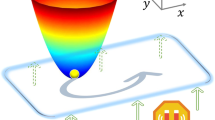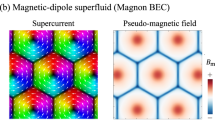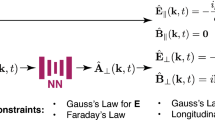Abstract
M. v. LAUE1 pointed out that thermodynamics can be applied to a superconductor only because it has, by displaying a Meissner effect, a unique state in a magnetic field. The classical electrodynamics of a perfect conductor, however, yields an ambiguous state1, but only if acceleration effects are neglected. Classical statistics of a free-electron gas give a unique state of zero current (theorem of van Leeuwen2) independent of the external magnetic field. It has never been shown, however, how a magnetic field can enter the electron gas without the assumption of surface friction3.
This is a preview of subscription content, access via your institution
Access options
Subscribe to this journal
Receive 51 print issues and online access
$199.00 per year
only $3.90 per issue
Buy this article
- Purchase on SpringerLink
- Instant access to full article PDF
Prices may be subject to local taxes which are calculated during checkout
Similar content being viewed by others
References
Laue, M. v., Theorie der Supraleitung (Springer-Verlag, 1947).
van Vleck, J. H., The Theory of Electric and Magnetic Susceptibilities (Oxford Univ. Press, 1932 and 1952).
Lindhard, J., Phil. Mag., 44, 691 (1953).
London, F., Superfluids, 1 (John Wiley and Sons, Inc., 1950, and Dover Publication, 1961).
Bardeen, J., Cooper, L. N., and Schrieffer, J. R., Phys. Rev., 108, 1175 (1957).
Author information
Authors and Affiliations
Rights and permissions
About this article
Cite this article
PFLEIDERER, J. Meissner Effect in a Classical Electron Gas. Nature 210, 614 (1966). https://doi.org/10.1038/210614a0
Issue date:
DOI: https://doi.org/10.1038/210614a0
This article is cited by
-
Electrodynamics of Perfect Conductors
International Journal of Theoretical Physics (2013)



